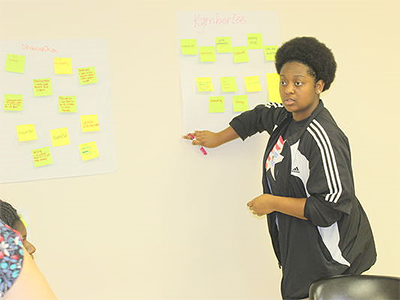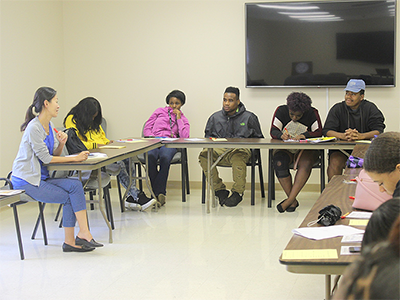Rust College students, like the majority of our peers at other Historically Black Colleges and Universities (HBCUs), are affected by societal injustices.
Rust College is one of the black colleges supported by the Black College Fund which provides financial support to maintain solid, challenging academic programs; strong faculties; and well-equipped facilities.
The majority of Brown/black people are automatically viewed as less than a human; the majority are first-time college students; and most students come from single parent homes. Being in a black/brown skin, being first to come to college, and coming from a single parent homes put so many at a disadvantage to survive from day-to-day. It often results in being in the wrong crowd or simply feeling the need to fit in to avoid being bullied by peer pressure.

It is in this context that over two-hundred first and second-year students as well as faculty participated in Rust College’s inaugural Ida B. Wells Social Justice Distinguished Lecture Series conducted by Rev. Neal Christie. This lecture series was followed by a series of workshops on mercy and justice that drew students, faculty and administration, led by Aimee Hong and Rev. Katie Monfortte. The workshops were important to help students not to confuse acts of charity with actions that truly address the barriers to justice we face in today’s world.
“It almost seems like we are trying to heal social justice issues by putting a band aid on a bullet wound,” Hong said. This statement made in a workshop with both students and faculty present, strongly resonates with us.
At the end of the workshops, we were convinced that social justice endeavors must be pursued now more than ever and that we must continually challenge ourselves to reflect on how our social justice endeavors can better address the roots of the problems of today’s world.
Social justice has a direct impact on students at Rust College and it starts with exercising our right to vote, learning how to impact the community as young adults, and understanding that youth have power and can practice self-confidence. These are urgent priorities for us as students in a United Methodist-related college.
Our generation needs empowerment as much as possible to ignite the fire of the importance of “social justice”! Why do we fight? Why do we need to be trained and knowledgeable leaders? How can we face any opposition if we don’t know how to address our needs and current situations?

Christie said, “As much as humanly possible, we want the new Social Principles to reflect the diversity of our worldwide connection.” The lecture and workshops invited us to think outside the box and challenge perspectives. He consistently halted the lecture to ask students to ponder questions that were thought-provoking and tough to answer, such as “who benefits from creating conditions that are damaging our environment?”
The Ida B. Wells Distinguished Lecture Series greatly enhances Rust College’s ability to achieve its overall mission of encouraging critical thinking, developing student leadership skills, and promoting student and community citizenship. It is an integral component of the College’s five major academic divisions: Business, Education, Humanities, Science and Mathematics, and Social Science.
We are grateful for Church and Society partnering with Rust students to make connections between our faith and social justice.
excerpt from a story by Damien Jackson, Former President, Kymberlee Taylor, Rust College Student Government President and Josiah Franklin, Rust College Student Government, Mr. Rust College, and President, Division of Business Student Academic Council
One of seven apportioned giving opportunities of The United Methodist Church, the Black College Fund provides financial support to maintain solid, challenging academic programs; strong faculties; and well-equipped facilities at 11 United Methodist-related historically black colleges and universities. Please encourage your leaders and congregations to support the Black College Fund apportionment at 100 percent.





